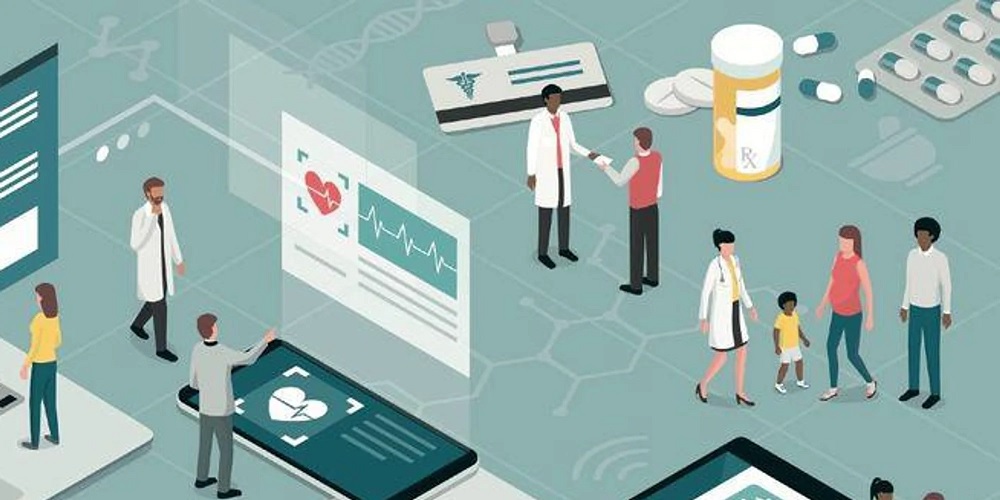4 Healthcare Digital Transformation Trends to Drive Innovation

The healthcare industry is always being driven forward as new trends bring innovations in care and records management. The current year is no different. Hospitals and other healthcare organizations are struggling to keep up with the benefits of artificial intelligence, wearable medical devices, and even the blockchain.
It can be a great deal to take in, especially when your team is actively learning about healthcare digital transformation trends with the goal of implementing new technologies. A way to streamline the process is by augmenting your IT staff with healthcare consultants. These experts know what innovations are happening in the medical industry, and they can help you take full advantage of these technologies.
1. More Patients Are Going Online
Since 2020, there has been a greater push toward remote healthcare and digital medical services. Patients are going online to research doctors, check their records, and even attend medical appointments.
The trend here is that more patients than ever before expect to use the internet in some way when it comes to their medical care. This includes everything from accessing their medical records in an online patient portal to chatting with a therapist during a telehealth appointment. Healthcare IT consultants are ideal sources of knowledge on how to go digital in multiple ways. They can also provide assessments of your organization and patient services to see how you can improve.
Here are a few ways that other companies are bringing online healthcare to the market:
- hims & hers: These telemedicine websites have access to diagnosis and treatment for specific health concerns. They also sell medication and healthcare supplements.
- Amazon Clinic: This telemedicine site is operated by Amazon. Patients can connect with clinicians for diagnosis and prescriptions to treat about twenty health conditions.
- ZocDoc: This online appointment booking service has been in operation since 2007. Patients can also book telehealth appointments with doctors.
2. Patient Records Are Being Stored in the Blockchain
The blockchain is more than an investment vehicle; it's also a way for healthcare organizations to store, transfer, and verify patient medical records. More and more hospitals are pairing patient records with blockchain technology to meet the strict standards for patient privacy and security.
Healthcare IT experts can help organizations research blockchain technology. There are also blockchain consultants who have a deep understanding of how these distributed ledger systems work. With the support of these consultancies, your organization will have a much easier time implementing blockchain verification of electronic health records or providing access to records.
3. Artificial Intelligence Is Being Implemented in Healthcare
Interest in artificial intelligence has exploded in 2023, with many healthcare providers looking for ways to incorporate it into their processes. From managing patient records to improving diagnostics, this technology has great potential.
In this case, a professional healthcare IT company can work with your staff to identify areas that could benefit from AI. For instance, chatbots work well in customer service roles, scheduling appointments and answering basic questions. Clinicians can also use pattern recognition software to help doctors look for indicators of disease during medical imaging diagnostics.
Other uses of AI are being explored by medical providers and healthcare organizations, such as:
- Providing companionship and support to lonely elders
- Watching patients through a camera as a part of care sitting
- Analyzing workflows, schedules, and operations to find areas for improvement
4. Patients Are Using Wearable Medical Devices
Almost without input from the healthcare industry, patients are turning toward monitoring their vitals through wearable devices. This trend can be readily seen with the Apple Smartwatch, which hosts apps and software that can monitor heart rate, activity level, and other factors.
Healthcare organizations are also starting to follow the trend by providing wearable devices to their patients to track movement, monitor for falls, and even record blood sugar levels and other information.
Healthcare IT consultants can help organizations identify useful wearable devices and bring them to market. These same consultancies offer custom software development and data analytics services to help patients use the hardware. The data from your wearables can even be sent to the clinician's office for review and stored in the patient records. Medical facilities may even choose wearables with RFID chips to track patient and staff movement for safety reasons.
Many kinds of wearables are available:
- Wristbands
- Rings
- Hearing aids
- Bio patches
Seek the Experts in Healthcare Digital Transformation Trends
While exploring the latest trends in digital healthcare is exciting, it's also time consuming. If you aren't constantly on the lookout for the newest medical innovations, there are things that you might miss.
Partnering with a healthcare IT consultancy ensures that your organization takes advantage of every potential improvement and digital product. These consultants manage the implementation process and will also provide your team with real training and skills to use these latest innovations.
Here at OtterSoft, we help healthcare technology providers drive innovation and integrate smoothly with legacy systems to keep things in motion, address the challenges of healthcare innovation, and seamlessly sync information. To see how we can help you overcome the challenges of healthcare innovation, contact us today!

